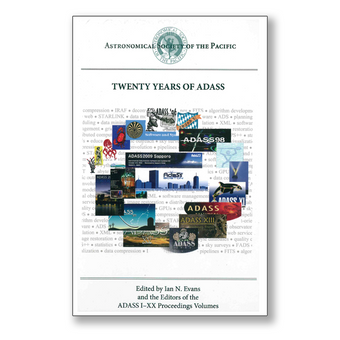Twenty Years of ADASS
Your purchase of this volume includes a printed copy and electronic access. With your purchase of this title online, you will receive email instructions on how to access the e-Book version. If you wish to use our printable order form and mail or fax it to us, you will need to include your email address on this form in order to receive electronic access to the purchased volume(s).
Volume MP-006
Editor(s): Ian Evans
Print ISBN: 978-1-58381-822-0
e-Book ISBN: 978-1-58381-823-7
Published: 2013
This ASP Monograph is a retrospective of the first twenty years of the Astronomical Data Analysis Software and Systems (ADASS) conferences, which have been held annually since their inception in 1991.
The ADASS conferences enable scientists and scientific software developers to present and explore the latest innovations in algorithms, software, software systems, and technologies for astronomical data analysis and data management. They are the leading international forum for discussions about astronomical software and foster significant cross-fertilization of ideas between professionals working in these areas.
Each ADASS conference focuses on a set of key topics ranging from advanced visualization to the virtual observatory, algorithm development to web services. These and a wide range of additional topics are addressed in a program that includes invited speakers, contributed presentations, tutorial sessions, demonstrations, and "Birds of a Feather" discussion forums.
This retrospective includes previously published articles from the ADASS I through ADASS XX proceedings volumes, selected by the individual proceedings editors. The papers not only reflect on the state of the art at the time of original publication but also retain the flavor of the individual conferences. Many of these papers have had significant impact on the development of astronomical software over the past two decades, and will continue to do so in the future.
This volume will be of interest to a wide audience of scientists, scientific programmers, and science historians who are interested in the development and management of software systems for the physical sciences.


